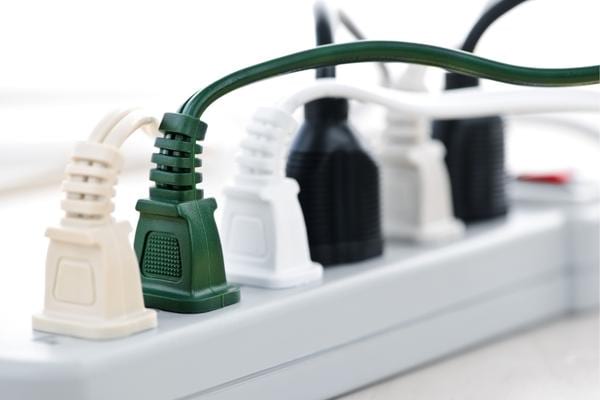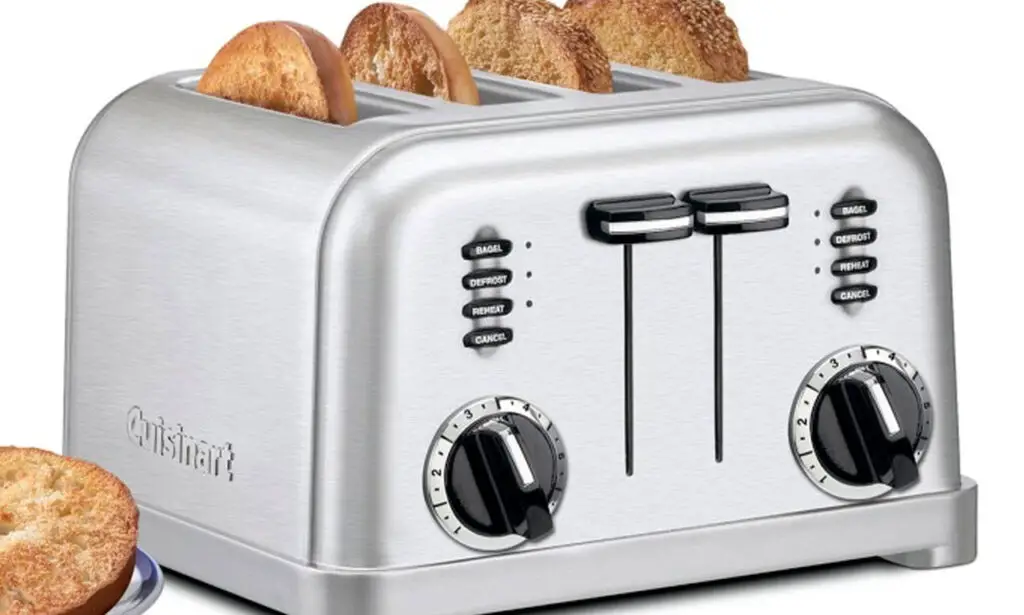
When we think of the past, one of the first thoughts that runs through our mind is how people lived without electricity. Nowadays, we can’t even imagine a day without it because all of our appliances and devices run on electricity.
The truth is, however, that most homes don’t have enough power outlets to keep everything running and charged, so most of us rely on power strips without being aware that appliances that consume a lot of energy become dangerous fire hazards when we plug them into a power strip.
Although power strips are the thing to go to when it comes to charging your phone or power an entertainment setup, there are certain devices that should never be plugged into a power strip.
Air conditioners, space heaters, toasters, and other appliances that use high wattage can easily cause power strips to overheat, which can easily lead to a fire hazard.

Even before plugging anything into a power strip consider the ammount of power they support. This is usually listed on the product itself.
High-capacity appliances need to draw a lot of power through an electrical circuit to work. Keep in mind that an appliance does not need to be large in size to draw large amounts of power.
Below is the list of appliances that should never be plugged into a power strip.
1. The oven: Even though the oven is not used continually, it is a power-hungry appliance that should not be plugged into a power strip. In fact, it should be plugged into its own wall outlet on its own circuit.
2. Refrigerator: Refrigerators require a lot of power and frequently cycle on and off which can easily overload a power strip and cause damage. Much like the oven, refrigerators require a wall outlet dedicated solely to powering the appliance.

3. Washing Machine: When turned on, washing machines pull a lot of power. This is the main reason why these appliances shouldn’t share a receptacle with any other appliance or device.
Most washing machines use a max of up to 1400 watts, putting it dangerously close to the max load of most power strips. On top of that while working, washing machines are usually left unattended and work longer hours, at least an hour, which is long enough for a power strip to overheat.
4. Heating: Portable heaters should never be plugged into a power strip because most of them use 1,500 watts of energy on their high setting and they usually run for extended periods of time.

5. Microwave: Since they consume a lot of energy when used, most microwave ovens are plugged into their own receptacle and that is always a good practice.
6. Coffee Maker: Those who own a coffee maker are not fully aware of the power these appliances use, and this is why they should never be plugged into any sort of power strip or extension cord.

7. Toaster: You may think that browning up slices of bread or bagels doesn’t require a lot of energy, but the truth is that toasters use a lot of energy when in use and they should be plugged directly into the receptacle rather than a power strip.
8. Another Power Strip: Power strips are not meant to be used in conjunction with another power strip, although many people do exactly that. This, however, violates most safety codes because it can easily lead to overloading the electrical system.
9. Electronics (Computer, TV, Router): These types of electronic devices don’t necessarily use a lot of power on their own, but they are sensitive to surges and you can find yourself with a burnt out computer or TV very quickly if you plug them into a power strip.
If you want to protect these sensitive devices from power surges, opt for a power strip that functions as a surge protector.
She Destroyed Our $3000 Wedding Cake and Paid Dearly
When a $3000 wedding cake and a meddling mother-in-law collide, chaos is inevitable. Today, we explore a story of family conflict, revenge, and the aftermath of hasty decisions. Sarah, the bride, shares her experience of how a ruined cake led to a major showdown on her big day. This tale raises the question: is seeking revenge ever justified in such situations? Let’s break down this sugary disaster and uncover the lessons about family dynamics, forgiveness, and the emotional intensity weddings can bring.

Thank you for opening up about your wedding day troubles. Your tale of revenge against your mother-in-law has sparked intense reactions and brings up some important considerations about family, forgiveness, and what we do when we feel wronged. Let’s dive into your experience and explore the situation from different angles.
A Wedding Day Disaster

Sarah, what was supposed to be a celebration of love turned into a battlefield of emotions and retaliation. Your custom wedding cake wasn’t just a beautiful centerpiece; it was a symbol of your special day. The destruction of that cake was a heartless and inconsiderate act that understandably caused you a lot of pain. Naturally, your anger and need for justice made sense, but the path you chose only seemed to increase the tension and hurt.
Let’s look more closely at what happened and consider how things might have gone differently.

The Cake Sabotage: The Emotional Toll

The loss of your $3000 cake wasn’t just a financial hit—it symbolized a deeper attack on something precious. When your mother-in-law took part in ruining the cake and gleefully snapping photos with her friends, it was a blatant disregard for your feelings and the significance of your wedding. Watching them laugh as they destroyed something so meaningful was no doubt a painful experience.
It’s natural to feel upset, betrayed, and a desire for justice when faced with such cruelty. However, reacting to these powerful emotions doesn’t always result in a positive outcome.
Revenge: A Short-Term Solution with Long-Term Impact

Out of frustration and hurt, you made the decision to retaliate by tampering with your mother-in-law’s outfit. At that moment, it probably felt like payback to see her humiliated just as she had humiliated you. However, this act of revenge only escalated the situation, creating new problems instead of resolving the old ones.
By lowering yourself to her level, you gave her the opportunity to flip the narrative and play the victim, which may have strained your relationship with your husband. It’s always important to think about how our actions can have lasting effects, especially when it comes to family.
Breaking the Cycle: Choosing Dialogue Over Drama

Although your mother-in-law’s actions were unacceptable, there may have been more productive ways to handle the situation. Even though direct communication can be difficult, it often brings better results than silent retaliation. Imagine if you had approached her before the wedding to calmly express your hurt and disappointment.
That conversation could have opened the door for her to apologize or, at the very least, understand how her actions affected you. Taking the higher road would have allowed you to maintain your dignity while possibly improving the relationship in the long run.
The Ripple Effect: How It Affects the Whole Family

Your husband’s reaction to your revenge highlights an essential point—your actions didn’t just affect your mother-in-law. The fallout from your retaliation had a wider impact on your family, casting a shadow over what should have been a joyful occasion.
Consider how your wedding guests, especially those who didn’t know about the cake drama, might have felt witnessing the tension and awkwardness. By seeking justice for yourself, you may have unintentionally made things uncomfortable for others.
Moving On: Healing and Restoring Peace

Sarah, while what happened on your wedding day cannot be changed, there’s still a chance to mend the situation. Start by having an open and honest conversation with your husband about how you felt and why you acted the way you did. Admitting that your reaction was driven by pain can be the first step toward healing.
It could also be helpful to sit down with your mother-in-law for a candid discussion. Allowing both sides to voice their grievances might pave the way for forgiveness and peace. Remember, you’re now part of the same family, and finding common ground will be key to a happier future.
Takeaways: Growth, Communication, and Rebuilding

While your mother-in-law’s behavior was undoubtedly cruel, your response only added to the damage. This experience can teach important lessons about communication, the pitfalls of revenge, and the intricate relationships within families. Going forward, focus on healing, forgiveness, and building better, more respectful connections with your new family members.
In the end, how we respond to others’ bad behavior says a lot about us. It’s not too late to turn this story around and lay the groundwork for a stronger, healthier family dynamic in your married life.
After the cake fiasco, all we could think about was how a Hollywood wedding would have gone. Join us next as we dive into 30 of the most stunning wedding dresses ever seen in movies!



Leave a Reply